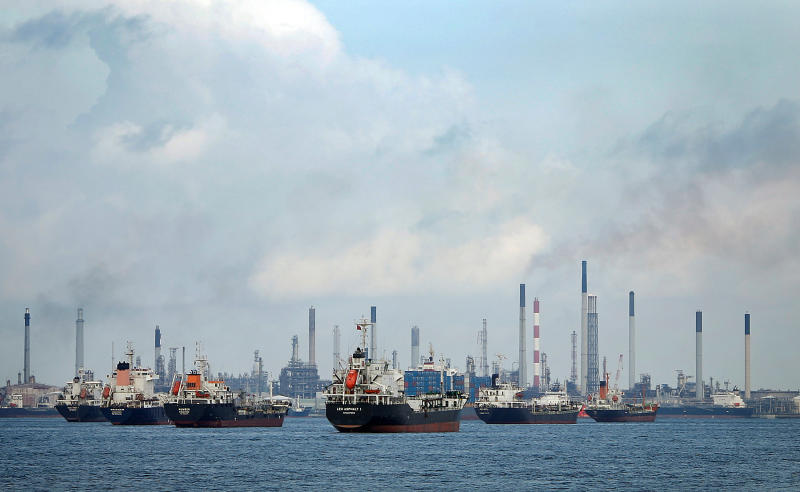Littoral states may not welcome China's move to raise security alert in Strait of Malacca: Experts
Sign up now: Get ST's newsletters delivered to your inbox

Ships anchored in front of a refinery on Singapore's Pulau Bukom in the Malacca Strait on July 6, 2014.
PHOTO: REUTERS
SINGAPORE - China might have acted on its own intelligence when it raised the alert for possible threats to its ships in the Strait of Malacca, but the move may not be welcomed by regional littoral states, maritime experts said.
On Tuesday (July 2), China's Transport Ministry, warning of "probable or imminent" threats, raised the security level for Chinese ships to 3 - the highest level - from 10pm that day. It did not give any reason for doing so.
While littoral states such as Singapore, Malaysia and Indonesia are aware of the heightened alert, they do not appear to share China's assessment.
Singapore's Maritime and Port Authority (MPA), responding to media queries, said on Friday that it has not received any information on immediate threats to ships sailing through the Strait of Malacca and Strait of Singapore, or to Singapore-registered ships.
It said that Singapore will maintain the current security level of 1 as per the International Ship and Port Facility Security Code (ISPS), adding that the Singapore Government is in contact with its counterparts to monitor the situation, without specifying the countries.
The International Maritime Organisation said on its website that security level 3 should be an "exceptional measure applying only when there is credible information that a security incident is probable or imminent".
Maritime specialist Collin Koh, who is a research fellow at the S. Rajaratnam School of International Studies (RSIS), said that China might have its own intelligence assessment of the threat to its shipping that may not have been shared with the MPA. This could explain the apparent difference in views about the threat level.
Dr Koh cited an online report by shipping journal Lloyd's List that said an internal e-mail alert from Chinese shipping company Cosco Shipping Energy Transportation suggested the threat was from Indonesian parties.
"China has long been sensitive about security and safety for its shipping plying through a natural strategic chokepoint such as the Strait of Malacca, be it a threat posed by a state or non-state actor," he said.
"So this alert level could have been understandable even though this unilateral move, it seems, may run afoul with the littoral states in the strait who don't desire an alarmist approach towards safety and security in the area," he added.
A Bloomberg report cited the head of the Indonesian Maritime Security Agency, Vice-Admiral Achmad Taufiqoerrochman, as saying that it was looking into the issue and did not see why China raised the alert status. Malaysia's Transport Ministry said it was aware of the notice but declined to comment, Bloomberg said.
Mr Ben Ho, a naval analyst with the Military Studies Programme at RSIS, said that the Chinese move was "quite a surprise" given that the maritime security environment in the region has been stable in recent years, with low incidences of piracy and sea robbery.
There were 76 piracy and armed robbery incidents in Asia waters last year, the lowest in more than a decade, according to figures released by the Singapore-based Regional Cooperation Agreement on Combating Piracy and Armed Robbery against Ships in Asia (ReCAAP) Information Sharing Centre in January this year.
In the Strait of Malacca and Strait of Singapore, there were eight reported cases of armed robbery last year.
Mr Ho said: "Any threat against Chinese shipping in the Malacca Strait littoral impinges on regional trade as a whole, and Beijing would do well to be more forthcoming about the rationale behind the raised alert."
He added that the threat is unlikely to come from a state source given the geopolitical stability of the region.
The Singapore Shipping Association (SSA), which represents more than 460 companies, said it was keeping tabs on the situation.
Its executive director Michael Phoon said that regardless of the ISPS security level, all ships are advised to be vigilant.
"SSA continues to work closely with the relevant authorities to monitor the maritime safety and security situation and to provide the necessary updates to the shipping community," he said on Friday.
The Malacca and Singapore straits are a major shipping route that carries about one-third of the world's traded goods.
Most of China's oil imports pass through the South China Sea via the Strait of Malacca.


